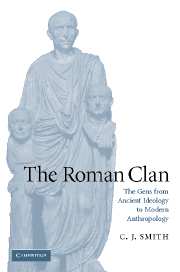Book contents
- Frontmatter
- Contents
- List of illustrations
- Preface
- List of abbreviations
- General introduction
- Part I THE EVIDENCE FOR THE GENS
- Part II TOWARDS AN INTERPRETATION OF THE GENS
- Appendix 1 Dionysius of Halicarnassus on the Roman curiae and religion
- Appendix 2 The missing curiae
- Select bibliography
- General index
- Index of ancient persons
- Index of passages discussed
Appendix 2 - The missing curiae
Published online by Cambridge University Press: 22 September 2009
- Frontmatter
- Contents
- List of illustrations
- Preface
- List of abbreviations
- General introduction
- Part I THE EVIDENCE FOR THE GENS
- Part II TOWARDS AN INTERPRETATION OF THE GENS
- Appendix 1 Dionysius of Halicarnassus on the Roman curiae and religion
- Appendix 2 The missing curiae
- Select bibliography
- General index
- Index of ancient persons
- Index of passages discussed
Summary
Serious attempts have been made to identify the missing curiae. Palmer and Carandini are the key figures in this area, and in both cases their arguments are flawed. The important premise from which both work is that there is a connection between the curiae and the Argeorum Sacraria, but this proves to rest on flimsy foundations. Although I would reject their conclusions, close attention to the argument actually reveals more about the curiae, and broadens the picture we have of the religious context in which they operated.
Palmer starts from Festus' distinction between Old and New Curiae. The text is problematic; the manuscript tradition has seven curiae which refuse to move, but only four are named. The easy emendation from VII to IIII is accepted by Lindsay. Nonetheless, there appears to be evidence here for a process of development, just as the tribes grew in number. The final number of curiae therefore is not a creation from nothing, and on either reckoning, neither four nor seven curiae can relate to the original three tribes. Festus implies that Romulus created thirty divisions, but these became too large for the Curiae Veteres; one might as easily assume that the curiae grew in number.
- Type
- Chapter
- Information
- The Roman ClanThe Gens from Ancient Ideology to Modern Anthropology, pp. 356 - 362Publisher: Cambridge University PressPrint publication year: 2006

